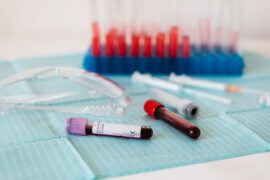Whether you’re chilling at home or traveling to the office, it’s important to beware of infectious diseases, especially if you could be the one spreading them. Infectious diseases are mostly caused by microorganisms and spread from person to person. They affect the wellbeing of an entire household, so preventing these infections from spreading should be your priority when you or someone around you is sick.
You must take extra precautions to prevent the spread of infectious diseases. Thanks to globalization, these diseases can spread rapidly via bodily fluids, contaminated surfaces, or airborne droplets. This blog shares some helpful tips to keep you and your loved ones safe. You can prevent infections now by:
1. Getting Vaccinated
Vaccination is the most important technique for preventing infections. Talk to your primary caregiver about your and your kids’ immunization. Stay up-to-date on your flu shots and consult your doctor about an additional range of shots when traveling abroad. Vaccines have previously prevented many infectious diseases, including smallpox, measles, polio, and many others. In 2021, they saved humanity from COVID-19, and that’s why you shouldn’t neglect to get vaccinated time after time.
2. Becoming A Public Healthcare Professional
If you want to play a more active role in preventing the spread of disease in your community, you can choose to realize this endeavor by making it a career. Today, distance learning has made the pursuit of knowledge easier, and you can become a public health worker by getting an epidemiology online MPH degree from a reputable educational institute. A Master’s in Public Health will equip you with the know-how to make evidence-based policies on disease control and create awareness among communities. It’s a lucrative career choice post the CCOVID-19 pandemic.
3. Washing Your Hands Frequently
When the first scientist prescribed handwashing as an infection-prevention mechanism, he was universally ridiculed for doing so. But now we know that washing hands for 20 to 30 seconds will kill most germs. Use soap and water or hand sanitizer with at least 60% alcohol. Using warm water is better than cold water. WHO recommends handwashing in the following situations:
- After using the bathroom
- Before and after eating your food
- Having physical contact with someone
- Coughing, sneezing, and picking your nose
- Stepping out of the house or coming back home

4. Disinfecting Household Objects
Infectious diseases also spread when an infected person contaminates household objects. That’s why you must disinfect frequently-touched surfaces when you or someone inside the house is sick. Tables, chairs, door handles, window handles, furniture, and railings must be cleaned regularly to avoid disease transmission. Avoid reusable rags, as they will just contaminate the surface again. Instead, buy some disposable ones to clean household objects. Use EPA-approved disinfectants, particularly when killing COVID germs. Additionally, wear masks and gloves, and ensure proper ventilation when using these disinfectants.
5. Interacting With Animals Carefully
Animals can also transmit infectious diseases to people and other surfaces, so act responsibly when interacting with them. You can reduce the risk of animal-borne infections by following these simple tips:
- Don’t disturb eating or sleeping animals
- Wash your hands after touching an animal
- Avoid rough play with animals; diseases can spread through bites or scratches
- Refrain from approaching, touching, or feeding wild animals
- Make sure your animals are vaccinated and keep them healthy
6. Practicing Food Safety
Food-borne infectious diseases can lead to certain health issues, such as meningitis. That’s why you must be careful when storing, preparing, and discarding your food. How do you kill microbes found in your food? Here are some useful food-safety techniques to keep your victuals germ-free:
- Wash your hands before cooking
- Separate raw food from cooked food
- Rinse meat and veggies under running water
- Cook food properly by using a meat thermometer
- Keep a clean kitchen, especially countertops, utensils, and cutting boards

7. Practice Safe Sex
1 in 5 Americans have at least one STI, and HIV isn’t even the most common one. The surest way to avoid STIs is to practice abstinence. But, for most people, this one’s not an option. Lucky for them, public health workers have suggested different other ways to prevent the spread of STIs:
- Engage in sexual intercourse with one partner at a time
- Do not have sex under the influence of drugs or alcohol
- Make sure you and your partner are tested for diseases like HVI
- Use a polyurethane condom to prevent the exchange of bodily fluids
- Practice good hygiene by washing your body, especially your genitals, hands, and face, before and after sex because some STIs also transmit from skin-to-skin contact
8. Wearing A Mask When Traveling
Wearing a mask reduces the risk of infectious diseases by 54%, even if nobody else is wearing one, so you should cover your face with a quality mask when going outside. In crowded spaces, a facemask protects you from airborne germs. Respiratory droplets containing microorganisms come out when an infected person coughs or sneezes, but a facemask prevents you from breathing in these droplets. In this way, it protects others from you if you’re sick.
However, wearing a mask isn’t a 100% guarantee against infectious diseases. You must still wash your hands and practice other WHO-recommended suggestions to keep yourself safe.
9. Practice Physical Distancing
As the COVID-19 public health emergency comes to an end, certain corona-related precautions should not be abandoned. One of these precautions includes physical distancing or the 6-feet rule. You can limit the spread of germs by avoiding physical contact with someone who’s sick. Nothing promotes the spread of diseases more than people being too physically close to one another. When you’re in crowded areas, standing in queues, or traveling via public transport, try to remain as physically distant from others as appropriate. Keep others and yourself safe.
Conclusion
Since the emergence of COVID-19, infection prevention has become a worldwide phenomenon. Organizations such as WHO made handwashing, mask-wearing, and physical distancing a part of the new normal. So, you must follow these tips to prevent the spread of infectious diseases and keep the people you love and yourself safe.



































